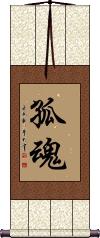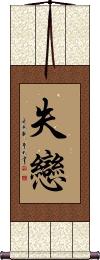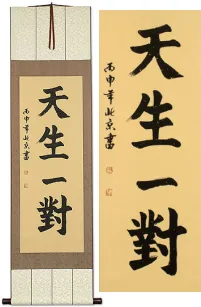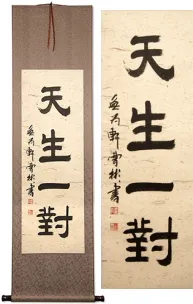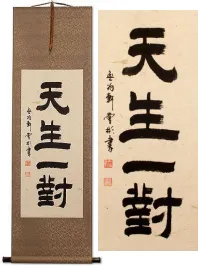Many custom options...
And formats...

Lost Soul in Chinese / Japanese...
Buy a Lost Soul calligraphy wall scroll here!
Personalize your custom “Lost Soul” project by clicking the button next to your favorite “Lost Soul” title below...
Lost Soul
Lonely Soul / Lost Soul
孤魂 is a Chinese title that means “lonely soul.”
In the context of being a soul without a mate or all alone, this can be translated as a “lost soul.”
Broken Hearted
In Chinese, this can mean losing one's love; to breaking up (in a romantic relationship); to feel jilted.
In Japanese Kanji, this means disappointing love, broken heart, unrequited love, or being lovelorn.
失戀 is also valid in old Korean Hanja, which means unrequited love, unreturned love, a disappointment in love, or a broken heart.
Note: In modern Japan, they will tend to write the more simple 失恋 form instead of 失戀. If you order this from the Japanese master calligrapher, expect the more simple modern version to be written (unless you give us instructions to use the older or more traditional version).
Lonely Soul / Solitary
This in-stock artwork might be what you are looking for, and ships right away...
Gallery Price: $200.00
Your Price: $90.88
Not the results for Lost Soul that you were looking for?
Below are some entries from our dictionary that may match your Lost Soul search...
| Characters If shown, 2nd row is Simp. Chinese |
Pronunciation Romanization |
Simple Dictionary Definition |
Variations: |
mayou / mayo まよう |
(v5u,vi) (1) to lose one's way; to get lost; to go astray; (v5u,vi) (2) to waver; to hesitate; to vacillate; to be of two minds (about); to be unable to make up one's mind; to not know what to do; to be at a loss; to be puzzled; to be perplexed; (v5u,vi) (3) to be captivated (by); to be infatuated (with); to be charmed (by); to be carried away (by); to be blinded (by); to be lost (in); to lose oneself (to); (v5u,vi) (4) to linger (of a departed soul); to be restless in one's grave; to be unable to rest in peace |
The following table may be helpful for those studying Chinese or Japanese...
| Title | Characters | Romaji (Romanized Japanese) | Various forms of Romanized Chinese | |
| Lost Soul | 喪魂失魄 丧魂失魄 | sàng hún shī pò sang4 hun2 shi1 po4 sang hun shi po sanghunshipo | sang hun shih p`o sanghunshihpo sang hun shih po |
|
| Lonely Soul Lost Soul | 孤魂 | gū hún / gu1 hun2 / gu hun / guhun | ku hun / kuhun | |
| Broken Hearted | 失戀 失恋 | shitsuren | shī liàn / shi1 lian4 / shi lian / shilian | shih lien / shihlien |
| Lonely Soul Solitary | 形單影隻 形单影只 | xíng dān yǐng zhī xing2 dan1 ying3 zhi1 xing dan ying zhi xingdanyingzhi | hsing tan ying chih hsingtanyingchih |
|
| In some entries above you will see that characters have different versions above and below a line. In these cases, the characters above the line are Traditional Chinese, while the ones below are Simplified Chinese. | ||||
Successful Chinese Character and Japanese Kanji calligraphy searches within the last few hours...

